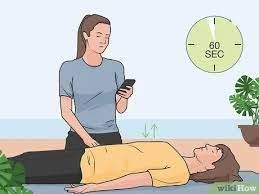A nurse is monitoring a client who is postoperative. Which of the following actions should the nurse take when collecting data about the client's respirations?
Place the client in a supine position.
Observe the movements of the client's chest wall.
Inform the client when beginning to observe his respirations.
Count the client's respirations for 15 seconds.
The Correct Answer is B
To accurately assess the client's respirations, the nurse should observe the movements of the client's chest wall. This can be done by visually inspecting the rise and fall of the chest or by placing a hand on the client's chest to feel the movements. This allows the nurse to assess the depth, rhythm, and effort of the client's breathing. I
It is important to observe the client's respirations without informing them, as this may cause the client to alter their breathing pattern consciously.
Counting the client's respirations for a full minute (rather than 15 seconds) provides a more accurate measurement.
Placing the client in a supine position may not be necessary for assessing respirations, as it is primarily focused on observing the chest movements.

Nursing Test Bank
Naxlex Comprehensive Predictor Exams
Related Questions
Correct Answer is B
Explanation
It is important for the client to remain still during the recording of a 12-lead ECG to obtain accurate and clear readings of the heart's electrical activity.
The orthopneic position (sitting upright and leaning forward) is typically used to help relieve shortness of breath in clients with respiratory distress and is not directly related to obtaining a 12-lead ECG.
Attaching a blood pressure cuff is not necessary for obtaining a 12-lead ECG, as it measures blood pressure and not the electrical activity of the heart.
A mild stinging sensation is not expected during the test. The electrodes used to record the ECG are typically adhesive and do not cause discomfort to the client
Correct Answer is C
Explanation
This situation involves a medication error that could potentially harm the client, and it should be reported through an incident report.
The following examples may not require an incident report:
A nurse discovers that a client's family member has administered a PCA dose. PCA (Patient-Controlled Analgesia) is a method of pain management that allows the client to self-administer pain medication within predetermined limits. If a family member administers the PCA dose without proper authorization or understanding, it is a safety concern that should be reported.
A nurse observes a client vomiting after receiving an oral pain medication. While this situation should be assessed and managed appropriately, it does not necessarily warrant an incident report unless there are additional factors or complications involved.
A nurse observes another nurse remove wrist restraints one at a time from a client who is currently calm. This situation may raise concerns regarding proper restraint removal techniques or potential safety issues, but it does not inherently indicate an immediate need for an incident report. However, if the nurse's actions were contrary to policy or posed a risk to the client's safety, it should be reported.
Whether you are a student looking to ace your exams or a practicing nurse seeking to enhance your expertise , our nursing education contents will empower you with the confidence and competence to make a difference in the lives of patients and become a respected leader in the healthcare field.
Visit Naxlex, invest in your future and unlock endless possibilities with our unparalleled nursing education contents today
Report Wrong Answer on the Current Question
Do you disagree with the answer? If yes, what is your expected answer? Explain.
Kindly be descriptive with the issue you are facing.
